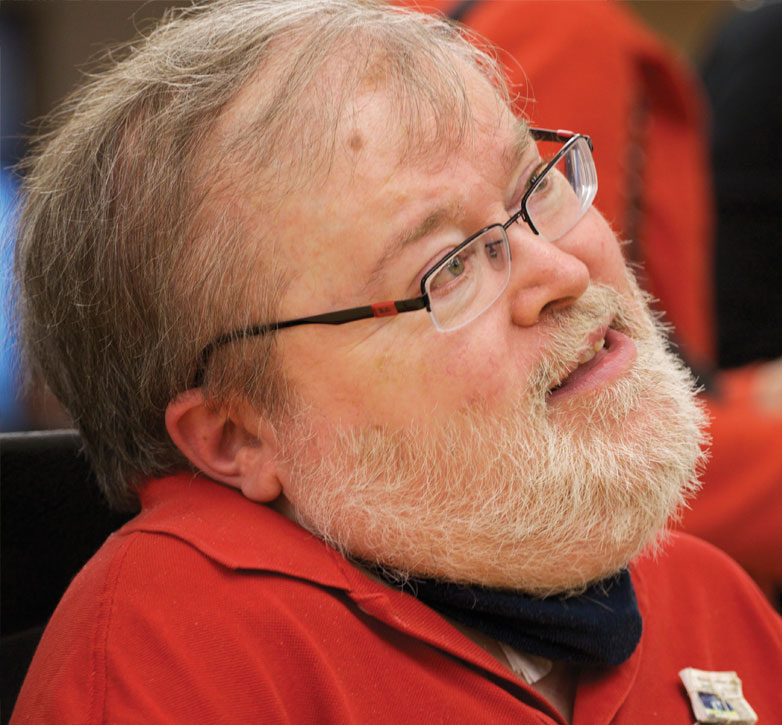A former student, gone too soon…
By Stephen Trumper.
This somber yet joyful celebration of a life lost much too early unfolded on an achingly beautiful day in late August. The location: a place where healing, frustration, happiness and resourcefulness mingle in sometimes magical ways.
We had gathered at Toronto’s Holland Bloorview Kids Rehabilitation Hospital, which sits on the edge of a gorgeous ravine, a carefree setting for a pioneering inclusive arts and crafts day camp known as Spiral Garden.
We were there, dozens of us, to remember Saburah Murdoch, 31, a one-time contributor to Abilities, one of my students in the journalism program at Ryerson University and, in her younger days, an enthusiastic camper and counselor at Spiral Garden.
A Ryerson colleague, Susan Crean, spoke at the memorial. She would later tell me: “Saburah was a huge asset to me as a teacher. It was because of her ability to empathize, and to find her way around obstacles—the intellectual ones, and the physical ones. All fueled by her joie de vivre.”
Also at the memorial was her friend, Aaron Broverman, another former student with a disability. He remembers her this way: “There was a time during our friendship when I resented that she was the only one I knew in Toronto who seemed to take initiative on my behalf. I wondered why no one else seemed to care. But that was Saburah; she always valued quality time with her friends before anything else.”
Also, says Aaron: “If she had a problem with your lack of accommodation and disability awareness, you’d hear about it. She taught me that sometimes you have to go balls to the wall because, otherwise, nothing gets done.”
I remember Saburah, who had been in two of my courses, as a smart, feisty young woman who possessed a deep understanding of the nuances of life with a disability. When Saburah first rolled into my magazine-editing class she was self-assured and ready to take on anything. A few years later, after she entered my feature-writing class, I sensed something had changed, her joy seemed to have dissipated. I was unsure why and we had a few struggles as I tried to push her, perhaps too hard, to go deeper than she wanted or needed to on her feature article.
What I didn’t know at the time was that, in addition to her lifelong dealing with TAR syndrome, there was a cancer lurking, leukemia, which sapped her strength and hospitalized her on several occasions, eventually causing her death.
At Saburah’s memorial, as her friends and family told stories and sang songs she loved, I kept thinking about how tough it is for kids with disabilities growing up into adulthood. The Spiral Gardens of this world—part sanctuary, part utopia—are terrific; the rest of the world not so much sometimes.
A few days afterwards I asked Aaron what he thought of the memorial: “Saburah would’ve loved it, beyond the embarrassment of all the attention. The one thing I did notice,” he added, “was that her life boiled down to all she had done in the face of ‘the struggle’ that was her life for people. But if you asked her, she’d call that just living her life. And really, what else was she supposed to do?”
But living life with a disability can be lonely, as her former instructor, Susan, points out: “Growing into adulthood for Saburah must have led to a kind of isolation. It is so easy to see the remarkable and admirable in her, and so much harder to understand the creative and personal struggles.”
I last saw Saburah more than one year ago. We were both in a tree-filled courtyard on the Ryerson campus. I was relaxing after a long class, talking to my PSW du jour. Saburah was on the other side, riding her scooter and walking her dog, looking lost in thought. I watched as she went round the circular pathway several times. It was as if she had found her downtown Spiral Garden, a place of refuge for when the rigors of life with disability, and now disease, overwhelmed. I dearly wish I had reached out to her that evening—even if it was just to say hello and offer a friendly helping of encouragement.
 Stephen Trumper serves on the board of the Canadian Abilities Foundation. He is an independent writer, editor and volunteer.
Stephen Trumper serves on the board of the Canadian Abilities Foundation. He is an independent writer, editor and volunteer.














